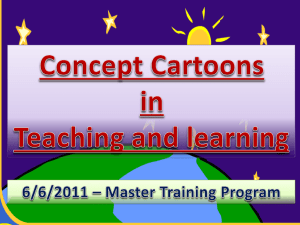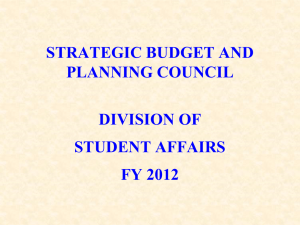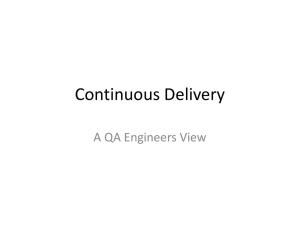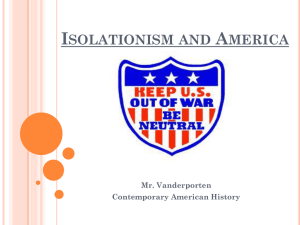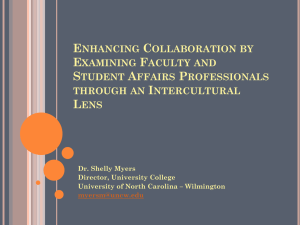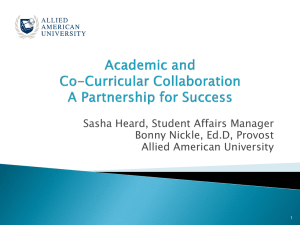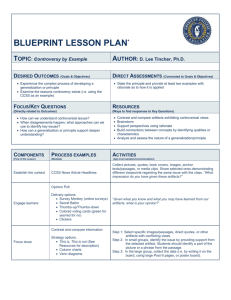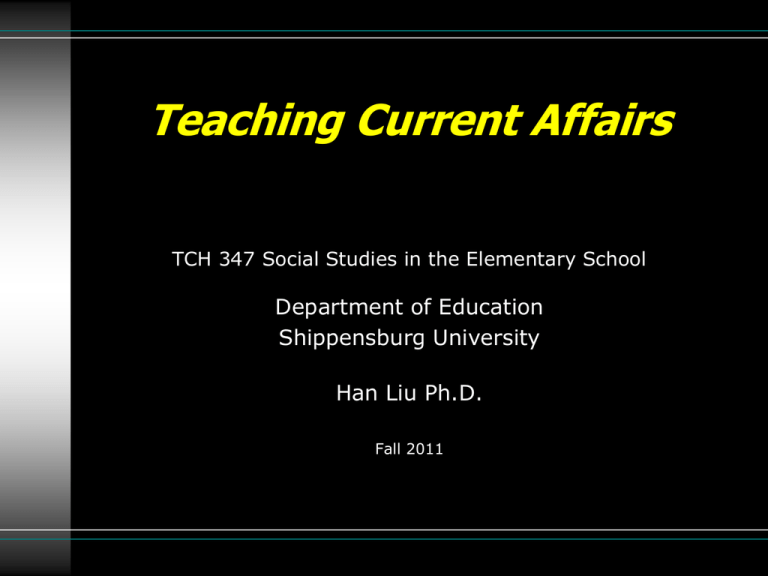
Teaching Current Affairs
TCH 347 Social Studies in the Elementary School
Department of Education
Shippensburg University
Han Liu Ph.D.
Fall 2011
Scope of Current Affairs
• Events in
• Family
• Neighborhood
• Community
• Local district
• The state
• The nation
• The world
Events of Social Developments
•
•
•
•
•
•
Election/Rallies/Protesting
Prevailing Speeches/Opinions
Economic growth (ups and downs)
Historical findings
Geographical discoveries
Scientific & technological breakthroughs
Issues of Public Concern
• Social Justice
• Gender Equality
• Law–Related Education
• Multicultural Education
• Economic Crisis
• Global Studies
• Environmental and Energy Studies
Special Events and Cultural Celebration
• National Holidays
Independence Day
Martin Luther King, Jr. Day
• Festivals
Thanksgiving
Chinese New Year
• Special Month/Week
Black History Month
Conservation Week
Controversial Issues
•
•
•
•
•
•
•
•
Same sex marriage
Abortion
Prayer in school
Affirmative Action
Multicultural education
Globalization
Job outsourcing
War on Iraq
Types of Controversy
• Factual Controversy
• Definitional Controversy
• Value controversy
• Cause controversy
• Solution controversy
Guidelines for Teaching Controversial Issues
• Select significant issues and problems understandable
to children
• Provide background factors, conduct cause and effect
analysis, predict possible consequences
• Present differing points of view on a certain issue,
respect for the views of others, refrain from taking sides
or propagandizing one point of view
• Promote higher order learning and boost critical thinking
and problem solving skills
• Nurture democratic civic virtues in maintaining openmindedness and the willingness to change one’s mind
based new information learned
• Encourage civic participation in public discourse and
action
Media Sources
• TV
• Internet
• Radio
• Newspaper
• Magazines
• Cartoons
Examples of Online Resources
• Newseum
• CNN Student News
• Scholastic News Quiz
Criteria to Select Events and Issues
•
•
•
•
•
•
•
•
Education value
Appropriateness
Relevance
Available information
Available time
Reliability
Time availability
Avoid too complex issues
Lesson Plan Development
• Develop specific goals and
objectives
• Identify concepts, concept clusters,
themes, and generalizations that
relate to a social studies topic
• Dovetail information into different
units that student have learned or
will learn
Class Activities for Current Affairs
• Level 1
Routine report of events with little discussion or
analysis
• Level 2
Reporting is followed by discussion of the most
interesting points without requiring any critical
analysis
• Level 3
Using problem-solving and critical thinking skills to
explore the significance of the event or issue by
reviewing supporting facts, considering different
points of view, and collecting additional information
(this level may need a independent unit)
Class Activities for Current Affairs
•
•
•
•
•
•
Daily sharing period
Student report on specific events
Talking Circle on current affairs
Weekly news reports by each student
Organizing debates on issues
Mimicking television/radio newscast by role
playing: anchorperson, news reporter,
editorial commentator, sports reporter, etc.
• Making connections between current affairs
and knowledge learned in textbooks
Debating Resource
• Four Corner Debate
Strongly Agree
Agree
Disagree
Strongly Disagree
• Debate Methods, Topics, and Lesson
Plans
• 50 Debate Prompts for Kids
Class Activities for Special Events
• Ask students of different ethnicities to report
their festivals and holidays
• Ask a local expert to talk about a special day
to the class
• Have students attend a celebration of another
culture
• Have students make a calendar of special days
of the year
• Have students celebrate a festival by
decorating the classroom with background
information and fun facts displayed
Student Projects
• Write letters to media and authorities
• Draw cartoons to illustrate events and
opinions
• Simulate TV news programs
• Hold press conference
• Create posters to voice opinions on
issue
• Collect data for hot social issues from
various sources
• Initiate programs, such as a food drive
Current Affairs Benefit Students
• Enhance and enliven instruction
• Reinforce concepts and concept clusters in
various subject areas
• Make connections of past, present, and the
future
• Bridges knowledge to real life outside of
classroom
• Develop ability to appraise the actions and
decisions of policy makers and political leaders
• Practice various thinking skills with concrete
events
• Appreciate multicultural heritages
Resources for Current Affairs
•
•
•
•
•
•
•
•
•
•
•
•
•
•
•
•
•
•
•
•
•
•
•
•
•
•
•
New York Times Student Connections
http://www.nytimes.com/learning/students/index.html
New York Times Learning Network
http://www.nytimes.com/learning/
New York Times Cartoons
http://www.nytimes.com/pages/cartoons/index.html
Political Cartoons
http://www.politicalcartoons.com/
Cartoons
http://www.cagle.com/
New York Times Student Quiz
http://www.nytimes.com/learning/students/quiz/
CNN Student News
http://www.cnn.com/EDUCATION/
Washington Post Kids Post
http://www.washingtonpost.com/wp-srv/kidspost/orbit/kidspost.html
Parade Magazine:
http://www.paradeclassroom.com/DL/quiz.pdf
Scholastic
http://teacher.scholastic.com/scholasticnews/games_quizzes/quiz/index.asp
News Bowl USA
http://www.newsbowl.com/
News for Kids on Yahooligans
http://yahooligans.yahoo.com/content/news/
Science News for Kids
http://www.sciencenewsforkids.org/
Times
•
http://www.time.com/time/classroom/glenfall2006/


